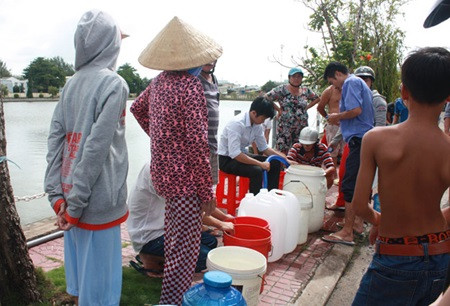 Local residents in Kien Giang province wait for their turn to fetch some fresh water supplied by the Kien Giang Water Supply and Drainage Ltd. Co (Photo: VNA)
Local residents in Kien Giang province wait for their turn to fetch some fresh water supplied by the Kien Giang Water Supply and Drainage Ltd. Co (Photo: VNA)The freshwater shortage in the Mekong Delta was discussed at a conference on combating drought held recently in Ben Tre province.
Dang Van Dung, deputy director of the Southern Hydro-meteorology Station, said the weather patterns around the country this year have been unusual, with the average temperature between May and September being 1-1.8 degrees Celcius higher than in 2014.
The rainy season began late and has been erratic, he said.
Rainfall in the Southern region in the first nine months ranged between 600mm and 1,500mm, 20-50 percent lower than normal. The forecast for October-April is for rainfall to be 20-40 percent lower than average.
Dung said the average temperature in the period could be 0.5-1.5 degrees Celcius higher than normal.
The unusual weather conditions reduced water levels in the upper section of the Mekong River from mid-May to record lows, with the level sometimes falling to one to two metres lower than the previous low.
As a result saltwater from the sea encroached earlier and further into the river.
The highest salinity is likely to be reached in March 2016, with the level beating the previous record set in the dry season of 2005.
A delegate from the Southern Institute for Irrigational Science said saltwater encroachment is likely to be severe in the 2015–16 dry season, badly affecting people's livelihoods and daily activities.
Nguyen Thanh Can, director of the Tien Giang province Department of Agriculture and Rural Development, said the saltwater encroachment has damaged some 2,000 hectares of rice this year and left people in a number of districts in Tien Giang facing water shortages.
In Hau Giang province some 70,000ha of rice have been damaged. Le Phuoc Dai, head of the province Irrigation Department, said in the first two weeks of July excessive saltwater caused a number of water treatment plants in Phung Hiep district to suspend operations.
Nguyen Van Ngan, deputy director of the Ben Tre Department of Agriculture and Rural Development, said saltwater has damaged 5,000ha of rice and 35ha of other crops this year. It has also caused freshwater shortages, especially in coastal districts like Binh Dai, Ba Tri, and Thanh Phu.
Le Manh Hung, deputy director general of the National Irrigation Department, said water levels were low in rivers in the Mekong Delta, causing severe shortages.
He urged relevant agencies to monitor changes in weather to quickly respond to them.
The drought in the delta has badly affected farms and households in the provinces of Long An, Dong Thap, and An Giang and Can Tho city. The worst hit have been families who farm fish.
According to Dr Le Anh Tuan, deputy head of the Institute of Climate Change Research at Can Tho University, freshwater volumes in the Mekong Delta have dropped by 60-65 percent compared to normal.
One of the primary causes is the El Nino phenomenon resulting from climate change, meteorologists have said.
But the reduction in rainfall in the Mekong's upstream and dam construction there also contributes to the problem, Tuan said.
The conference on October 16, titled "Implementations of Plans to combat drought and saltwater encroachment for a better 2015 – 2016 winter-spring Crop", was organised by the Ministry of Agriculture and Rural Development's General Department of Irrigation.-VNA





























